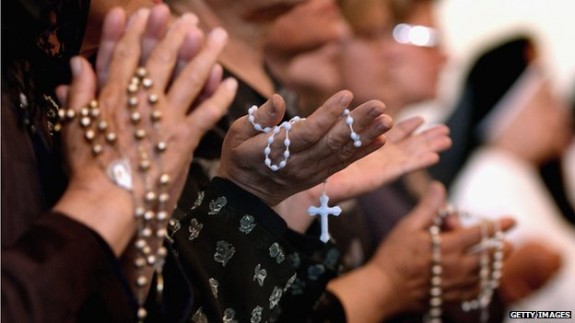Europe’s hard times are leading more people to take a closer look at Catholic social thought.
From the BBC:
A new zeitgeist is capturing business people, academics and political players from both the Left and Right, looking for an ethical alternative for our time. Their inspiration? Catholic teaching.
In many ways these are difficult times for the Catholic Church. Congregations in England are still in decline, child abuse scandals around the world have cast a long shadow and in many areas of policy – from euthanasia to gay marriage – the church’s fixed positions make it sound outdated and out of touch.
Yet in the last couple of months I have received some intriguing invitations from Catholic friends: one to an event on business ethics organised by Catholic bishops and featuring some of our most high-profile corporate leaders.
Another to a discussion of the progressive values after the credit crunch with prominent Labour advisors and Catholic theologians.
The common thread running through these events is a set of ideas going under the name “Catholic Social Teaching”.
I set out to understand more about these ideas, to find out why they are engaging so many different groups of people right now, and whether their current influence is likely to make any substantive difference to policy or politics.
The challenges of today’s economic struggles echo with the origins of Catholic Social Teaching.
Although its roots can be traced back not just to the Bible, but to the ideas of Aristotle, rediscovered in the 13th Century by St Thomas Aquinas, the modern expression of Catholic Social Teaching came in an encyclical – the highest form of papal teaching – titled Rerum Novarum and issued in 1891 by Pope Leo XIII.
The Pope offered the “gift” of Catholic social thought to a troubled world.
He called on the one hand for compassion for the poor and respect for the dignity of labour and, on the other hand, for respect for property and the family – all held together by the core idea of the common good.
The encyclical can be seen as the Church both realigning itself towards the concerns of the urban working-class, but also seeking to find a path of reform as an alternative to the growing threat of revolutionary unrest.
These origins offer one explanation for the current revival of interest in these ideas. For today too we live in a time of rapid change and social unrest.
Just this week a report from the Resolution Foundation predicts a further decade of stagnant living standards in the UK – a pattern shared with the US and most of Europe.
With austerity also stalking these countries, it is not surprising that various forms of anti-capitalist sentiment – of which the Occupy movement is the most high profile – have moved from the margins to the mainstream.











